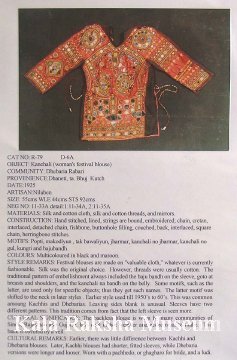|
Description
|
| MATERIALS: Silk and cotton cloth, silk and cotton threads, and mirrors. CONSTRUCTION: Hand stitched, lined, strings are bound, embroidered; chain, cretan, interlaced, detached chain, fishbone, buttonhole filling, couched, back, interlaced, square chain, herringbone stitches. MOTIFS:Popti, makodiyun, tak bawaliyun, jharmar, kanchali no jharmar, kanchali no gul, kungri and bajubandh. COLOURS :Multicoloured in black and maroon. STYLE REMARKS: Festival blouses are made on ''valuable cloth,'' whatever is currently fashionable. Silk was the original choice. However, threads were usually cotton The traditional pattern of embellishment always included the baju bandh on the sleeve, goto at breasts and shoulders, and the kanchali na bandh on the belly. Some motifs, such as the latter, are used only for specific objects; thus they get such names. The latter motif was shifted to the neck in later styles. Earlier style used till 1950's to 60's. This was common amoung Kachhis and Dhebarias. Leaving sidess blank is unusual. Sleeves have two different patterns. This tradition comes from fact that the left sleeve is seen more. CULTURAL SIGNIFICANCE: The backless blouse is worn by many communities of Sindh, Rajasthan and Gujarat. It is cool in hot weather and economical to make. The back is coverd by a veil. CULTURAL SIGNIGICANCE: The backless blouse is worn by many communities of Sindh, Rahasthan and Gujarat. It is cool in hot weather and economical to make. The back is covered by a veil. CULTURAL REMARKS: Earlier, there was little difference between Kachhi and Dhebaria blouses. Later, Kachhi blouses had shorter, fitted sleeves, while Dhebaria versions were longer and looser. Worn with a pachhedo, or ghaghro for bride, and a ludi. Kanchali, Woman's festival blouse. |
Kanchali
-Rabari Arts
-Copyright Statement

COPYRIGHT INFORMATION ~ When using this image, the credit information should be in the following format: Image courtesy of the Kala Raksha Museum.

COPYRIGHT INFORMATION ~ When using this image, the credit information should be in the following format: Image courtesy of the Kala Raksha Museum.